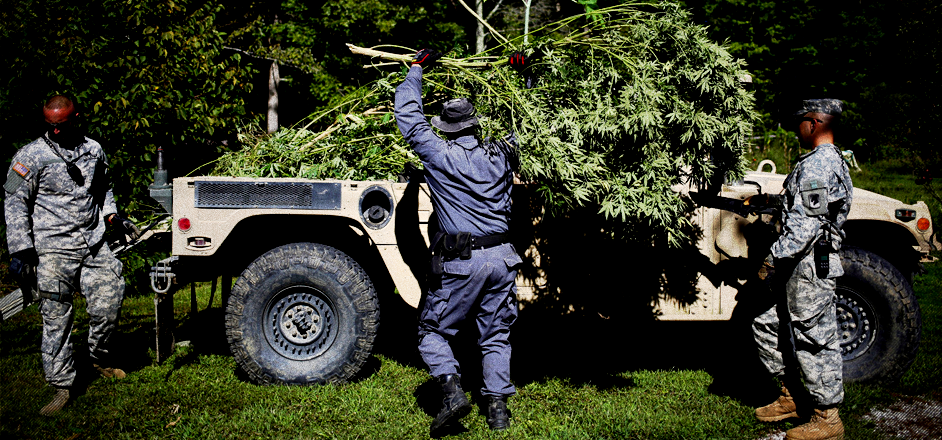The marijuana black market continues to flourish in Colorado, despite nearly four years of legalization. It’s an illegal niche that the state can’t seem to quash, despite their greatest efforts to straighten out the business of pot.
Routinely, police teams flood residential neighborhoods and industrial areas, swarming buildings and bursting through the doors of unsuspecting criminals. People are going to jail left and right. Weed is being confiscated en masse. And the hydra holds out; for every one illegal grow-op busted, it seems like two more flower into existence to replace it.
The grey area legal status of marijuana in the U.S. is what’s truly responsible for, not only the cost of these sting operations, but the entire black market niche altogether. Legal cannabis is a trend that is not likely to reverse in America, it’s making states like Colorado and Oregon hundreds of millions of dollars in tax revenue annually. The Feds’ reluctant holdout to legalize marijuana nationwide serves only to fuel criminal trafficking, and sustain the black market demand for weed in America.
It's basic capitalism. When a window of opportunity presents itself, the entrepreneurial spirit steps up to the plate and take full advantage of it. And, the fact that Colorado is a bastion of legal weed, surrounded by prohibition states, has created a pristine business model for any mogul with a little illegal initiative. It’s a simple enough idea: set up an operation with as many plants as possible, harvest the bud when the time is right, and then export it over state lines to sell for twice — or even three times the legal price. Those are high returns … but it’s a risky gamble, and the stakes are perilously high.
Operation Toker Poker is a prime example — this cannabis conspiracy included 74 individuals that ran a racket growing massive amounts of weed and running it into other states. According to a press release from the Colorado General Attorney’s Office, the organization produced somewhere around 100 pounds of pot per month. And at $2000 per pound, they reaped in millions of dollars between 2012 and 2016, selling their product in places like Texas, Ohio, Nebraska and Kansas.
But in January of 2014, police caught wind of the operation, and by 2016 they’d executed over 150 search warrants, confiscated 4000 pounds of marijuana, 18 warehouses and storage units, and 33 residential grow-ops across Colorado’s Front Range. The jig was up. And by June of 2016, almost all 62 involved were in custody, charged with 31 felony counts and awaiting trial.
It was the biggest marijuana bust in Colorado since pot was legalized — but it was hardly an isolated event. Also in June, a gigantic outdoor grow-op of 7,400 plants was discovered in Pueblo county (two hours south of Denver), a bust with an estimated street value of over $7 million dollars. The operation was discovered by a hiker on U.S. Forest Service land, and was the fifth such operation found on/near the San Isabel National Forest.
Then in March, a Castle Rock, Colorado, resident Michael Stonehouse and 15 others were arrested in connection with what the police coined the Stonehouse Operation. It was another statewide syndicate illegally growing in 5 different counties throughout Colorado, and exporting millions of dollars’ worth of bud into 36 states across the country.
Examples like these go on and on. And while it may comfort some, knowing that thousands of pounds of marijuana are being snatched up by cops and shipped away to [eventually] be disposed of — a thoughtful observer might find themselves under the impression that this is all an awful waste of time and public resources.
Let’s consider Operation Toker Poker alone: in the words of Denver Police Chief, Robert C. White, “The success of stopping this illegal operation was due to the collaboration of multiple [eight] federal, state and local partners, which included more than 250 police officers, who worked tirelessly in [order] to bring these criminals to justice.”
That’s an expensive gig. And one that obviously doesn’t do much to stem the problem — there’s always another grow-op out there. Our police and federal agents are essentially playing a grossly expensive game of whack-a-mole, and milking taxpayers to cover the cost. Why not? After all, they’re stopping a dangerous drug from getting into the hands of Colorado’s neighbors, preventing people in prohibition states from catching another case of reefer madness.



Leave a Reply